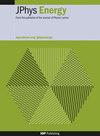交叉耦合对多氯材料等温熵变的贡献
IF 6.3
3区 材料科学
Q1 ENERGY & FUELS
引用次数: 3
摘要
不同自由度强耦合的多铁性材料,由于施加或去除不同的外场,容易产生巨大的多色效应。当单热效应都是常规的(或都是逆的)时,这些材料对两个场的联合作用表现出协同响应,而当单热效应之一是常规的而另一个是逆的时,则会发生非协同响应。在所有情况下,多热量特性(等温熵和绝热温度变化)不是由相应的单热量量的简单相加产生的,因为自由度之间的相互作用(交叉耦合项)有贡献。本文详细分析了交叉耦合项对协同和非协同多色材料多色熵值的贡献。我们首先介绍了解释多色效应的基本热力学概念,然后通过几个模型实例说明了交叉耦合项的贡献。最后分析了两种具有协同多色效应和非协同多色效应的原型材料的实际情况。本文章由计算机程序翻译,如有差异,请以英文原文为准。
Cross-coupling contribution to the isothermal entropy change in multicaloric materials
Multiferroic materials with strong coupling between different degrees of freedom are prone to exhibit giant multicaloric effects resulting from the application or removal of diverse external fields. These materials exhibit a synergic response to the combined action of two fields when the monocaloric effects are both conventional (or both inverse), while a non-synergic response occurs when one of the monocaloric effects is conventional and the other is inverse. In all cases, the multicaloric properties (isothermal entropy and adiabatic temperature changes) do not result from the simple addition of the corresponding monocaloric quantities because there is a contribution from the interplay between degrees of freedom (cross-coupling term). In this paper, we analyse in detail the contribution of the cross-coupling term to the multicaloric entropy values obtained for both synergic and non-synergic multicaloric materials. We first introduce basic thermodynamic concepts accounting for the multicaloric effects, and next the contribution from the cross-coupling term is illustrated via several model examples. We finally analyse the realistic situation for two prototype materials with synergic and non-synergic multicaloric effects.
求助全文
通过发布文献求助,成功后即可免费获取论文全文。
去求助
来源期刊

Journal of Physics-Energy
Multiple-
CiteScore
10.90
自引率
1.40%
发文量
58
期刊介绍:
The Journal of Physics-Energy is an interdisciplinary and fully open-access publication dedicated to setting the agenda for the identification and dissemination of the most exciting and significant advancements in all realms of energy-related research. Committed to the principles of open science, JPhys Energy is designed to maximize the exchange of knowledge between both established and emerging communities, thereby fostering a collaborative and inclusive environment for the advancement of energy research.
 求助内容:
求助内容: 应助结果提醒方式:
应助结果提醒方式:


